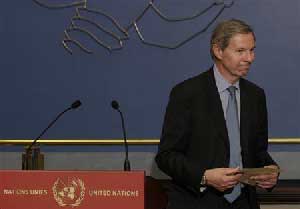31 May 2012 - {{hitsCtrl.values.hits}}
 If the U.N. Security Council does not take swift action to pressure Syria to end its 14-month assault on the opposition, member nations may have no choice but to consider acting outside the United Nations, the U.S. envoy to the world body said on Wednesday.
If the U.N. Security Council does not take swift action to pressure Syria to end its 14-month assault on the opposition, member nations may have no choice but to consider acting outside the United Nations, the U.S. envoy to the world body said on Wednesday.
14 Nov 2024 26 minute ago
14 Nov 2024 1 hours ago
14 Nov 2024 1 hours ago
14 Nov 2024 3 hours ago